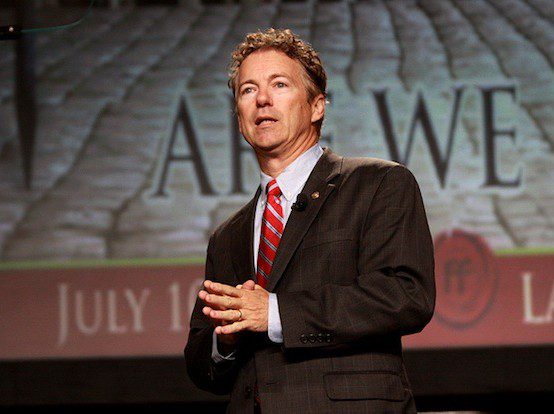The Fourth Republican Debate

Last night’s main debate included more attention to foreign policy than I expected. While they spent less than twenty minutes of their two hours on these issues, there were a number of important and revealing exchanges.
Rubio showed off his reflexive interventionist side much more last night than he has in previous debates, and resorted to using the dishonest, misleading label of “isolationist” when he asserted that Paul was a “committed isolationist.” Besides being untrue, it confirmed how shallow his arguments against realist and non-interventionist Republicans have always been. As he usually does, he framed other states’ actions in terms of U.S. “weakness,” because he apparently can’t grasp that other states have interests unrelated to our action or inaction and will pursue them for their own reasons. He mentioned that ISIS has a foothold in Libya, but neglected to mention that he was a supporter of the war for regime change that helped make that happen. Rubio liked to rattle off a litany of problems abroad and attribute them to Obama’s supposed record of “doing nothing,” but in most of these cases Obama’s mistake has been to take sides in conflicts where the U.S. had nothing at stake. He was channeling George W. Bush at some points when he insisted that jihadists “hate us for our values” and did a decent Lindsey Graham impression when he made the alarmist claim that ISIS will be “coming to us” next. Regrettably, the audience at the debate responded well to a lot of his rhetoric, but he makes it very easy for people to see him as a neoconservative factional candidate and nothing more. In general, Rubio turned in a decent performance, but it was one in which he increasingly relied on canned and prepared scripts to respond to almost every question, and that act is beginning of wear a bit thin.
Overall, this was Paul’s best debate by far, and he was finally playing the role that many people thought he could play in these debates by opposing some of the more ludicrous and reckless foreign policy statements from the other candidates. He pushed back on the hawks’ endorsement of a “no-fly zone” in Syria (though he erred a bit in later statements by saying Iraq when he meant to say Syria), and corrected Trump on the TPP. He had a crowd-pleasing line about that we shouldn’t “arm our enemies,” but if you didn’t already know that U.S. arms sent into Syria and provided to the Iraqi government have ended up in the hands of ISIS and the Nusra front it might not have made much sense. There was still not enough scrutiny of the hawkish candidates’ statements on their support for “no-fly” and safe zones in Syria, and none of them was pressed to answer who would be defending these safe zones on the ground. They were permitted to propose much more aggressive policies without being called out on it with the exception of Paul’s criticisms.
Bush repeated his line that the U.S. won’t be the “world’s policeman,” but that it will be the “world’s leader,” which for all practical purposes amounts to the same thing. He assumes that the U.S. has to respond to every crisis and conflict, and that if it doesn’t it creates an unacceptable “vacuum.” Fiorina advocated once again for her program of needless provocation of Russia. Her position on a “no-fly zone” in Syria implied that she thought the airspace of all countries in the world rightly belongs to the U.S.: “We must have a no fly zone in Syria because Russia cannot tell the United States of America where and when to fly our planes.” Towards the end of one answer, she just started tossing out the names of almost every nationality in the Near East as if she were trying to prove that she knew them. Kasich manically listed all of his bad and questionable foreign policy views at one point that included endorsing a Syria “no-fly zone,” embracing the Sisi dictatorship in Egypt, and praising the Saudis as “fundamentally our friends.” The first position is obviously dangerous, the second is misguided, and the third is delusional. Kasich also predictably said that the U.S. has “no better ally” in the world than Israel, which will come as news to all of the actual treaty allies that the U.S. has around the world.
The most surprising thing last night was what didn’t happen. Rubio once again avoided coming under attack for his immigration position, and Cruz and Trump quarreled instead with Bush and Kasich on this subject. This is Rubio’s biggest vulnerability, so it’s puzzling that his rivals aren’t using the debates to expose it to a much wider audience, but he continues to be lucky in having opponents that aren’t taking full advantage of this.
Comments